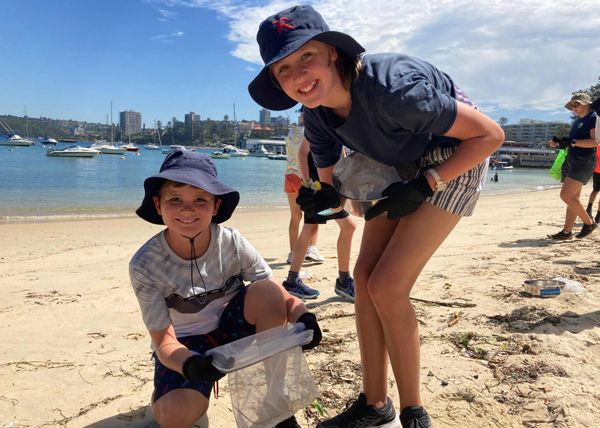Developing Skills for Lifelong Learning
By Nick Martin, Assistant Head of Junior School Learning 3‑6
Over the past two weeks, we have sent our Year 5 and 6 students out into the wilds of the world to experience two very unique experiences. Whilst the experiences were quite different, they both provided an opportunity for our students to develop essential skills that will serve them into their future.
Our Year 6 students engaged with the ‘PYPx: Urban Heart’ program, which acts as a frontloading experience for our upcoming Primary Years Programme (PYP) Exhibition. The Year 6 students spent four days in Sydney meeting people and organisations who are taking action to make our world a better and more peaceful place. These students engaged with some of the biggest issues facing our world, including sustainability, reconciliation and equity. It was a wonderful week highlighted by respectful and thoughtful students engaging sensitively and reflectively. We are so excited to see how our Year 6 students are able to use this experience as a springboard towards Exhibition, in which they will research an issue that is meaningful and motivating to them.
In comparison, our Year 5 students ventured into the bush, near Tallong, to participate in a physically demanding and resilience testing, three-day camp program. Year 5 students engaged in a range of activities, including mountain biking, abseiling, high ropes, canoeing, camp craft, initiatives and hiking. Our Year 5 students were also wonderfully well-behaved, connected with each other in positive ways, encouraged each other when facing challenges and conducted themselves with respect and manners.
Despite having lots of fun, our students also developed a range of skills that will support them in learning and in life for the rest of their lives. In a PYP school, these skills are referred to as the Approaches to Learning (AtLs). The PYP approaches to learning are designed to help students develop the skills, attitudes and attributes they need to become lifelong learners. These approaches are divided into five categories: thinking, communication, social, self-management and research. The table below the photos attempts to draw out some of the ways these skills were developed through our camp program.
| Year 5 Bush Camp | Year 6 Urban Camp |
Thinking Skills | - Developing creative thinking skills by designing and implementing innovative solutions to problems encountered during the outdoor experience, such as constructing shelter and navigating challenging terrain.
- Enhancing critical thinking skills by evaluating and analysing information related to the natural environment, and making evidence-based decisions.
- Building metacognitive skills by reflecting on personal experiences and learning, and making connections to prior knowledge and future goals.
| - Developing an understanding of cause-and-effect relationships by observing the impact of urban development on the environment and communities.
- Applying critical thinking skills to analyse complex issues and engaging with creative solutions to address them.
- Using inquiry-based approaches to investigate urban issues and their impact on quality of life.
|
Communication skills | - Developing effective communication skills through verbal and non-verbal communication while working with others in a team in a challenging environment.
- Enhancing listening skills to follow instructions and understand group goals and objectives.
- Building skills in expressing themselves creatively to communicate the essence of their outdoor experiences.
| - Developing effective communication skills through interactions with people from diverse backgrounds in the urban environment.
- Practising active listening and asking clarifying questions to deepen understanding of others' perspectives and experiences.
- Using a range of communication tools such as maps, brochures, and digital media to convey information and experiences to others.
|
Social Skills | - Developing teamwork and collaboration skills by working together in small groups to achieve common goals.
- Enhancing empathy and cultural awareness by interacting with others from diverse backgrounds and perspectives.
- Building conflict resolution skills by navigating and resolving interpersonal conflicts that arise during the outdoor experience, developing mutual respect.
| - Developing communication skills through interactions with diverse groups of people in the urban environment.
- Developing empathy and understanding towards different cultures and lifestyles through experiencing and observing them in an urban setting.
- Collaborating with peers to plan and execute activities, navigate through urban spaces and solve problems that arise.
|
Self-management skills | - Developing self-awareness by reflecting on personal strengths and weaknesses, and setting personal goals for growth and improvement.
- Building resilience by facing new challenges in the bush, and developing adaptability and flexibility to changing environments and circumstances.
- Developing planning and time-management skills by organising and prioritising tasks in order to meet group and individual goals.
| - Developing organisation and time-management skills through executing a four-day urban experience.
- Demonstrating resilience and adaptability in response to unexpected challenges or changes in plans.
- Developing self-reflection skills to evaluate their own learning and growth through the urban experience.
|
Research skills | - Developing inquiry skills by engaging in hands-on learning and exploring the natural environment through observation and experimentation.
- Building analytical and critical thinking skills by evaluating information from different sources, and making connections to prior knowledge.
| - Developing research skills by gathering and analysing information about a variety of issues and solutions.
- Applying critical thinking skills to evaluate the credibility and reliability of sources, and synthesising information from multiple sources.
- Using technology to access and organise information for further analysis and reflection.
|
I would also like to extend my absolute gratitude to the teachers who embarked upon these experiences with the Year 5 and 6 students. This is another example of the dedication to students and to learning that our teachers demonstrate constantly. I would also like to acknowledge Ms Tracey Markovic for her organisational work prior to and during these camp experiences.
